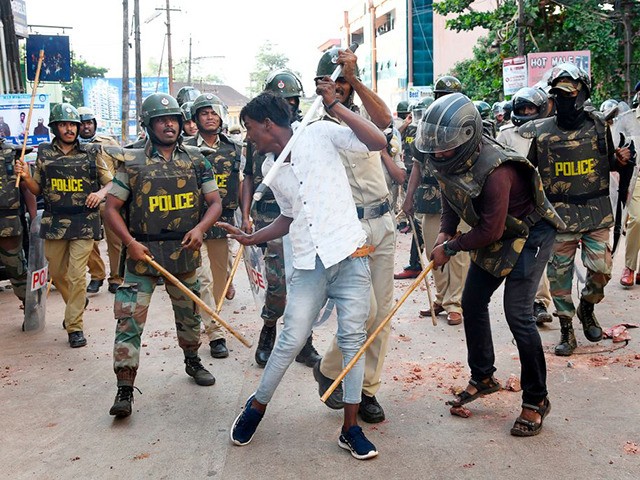Indian police made hundreds of arrests on Thursday to enforce a ban on protests imposed after the passage of a controversial law that makes it easier for refugees from neighboring Muslim-majority countries to become citizens if they faced religious persecution at home.
Opponents of the law are demanding that it include Muslims despite the fact that it specifically identifies religious persecution as the reason for the citizenship shortcut.
The Associated Press reported dozens of demonstrations were scheduled in defiance of the ban. Among those arrested were prominent historian Ramchandra Guha, who wrote a biography of Mohandas Gandhi, and Yogendra Yadav, head of the recently formed Swaraj India party.
Guha, 61, was arrested while in the middle of giving a televised interview on the sidelines of a protest march. “I have been detained for holding a poster of Gandhi and speaking about the constitution to the press. I am protesting non-violently, but look they are stopping us!” he told the cameras as he was dragged away.
As with other contemporary examples of governments attempting to suppress protest movements, Internet and mobile phone services were blocked in some areas to keep demonstrators from collaborating online to organize events.
The BBC reported on Thursday morning that the total number of arrests is now in the thousands across India, with demonstrations defying the police ban in Bangalore, Hyderabad, Patna, Chandigarh, and Delhi. Eyewitnesses said over a dozen buses were needed to haul the detainees away and detention facilities were overwhelmed by the numbers.
A large demonstration in Mumbai, held at the same location where Gandhi called for Indian independence in 1942, was expected to draw members of India’s “Bollywood” film community.
Public calls for people to join the protests have stressed that they should be peaceful, but violent clashes and instances of arson have been reported. Businesses, rail stations, and airports have been largely shut down by the demonstrations. Protesters have complained of police brutality during their arrests.
The office of the U.N. secretary-general on Tuesday expressed concern about “violence and the alleged use of excessive force by security forces” in India and called for “restraint” in the police response.
Supporters of the citizenship law, including Prime Minister Narendra Modi, pushed back against criticism by insisting the restrictions against Muslims are justified because they are not persecuted minorities in the majority-Muslim countries adjacent to India.
Modi accused critics of “spreading lies and rumors” and “instigating violence” by telling Muslims already in India that they could be deported under the new law, a fear exacerbated by India’s simultaneous effort to identify illegal aliens living in its border regions.
Protesters have accused Modi and his Bharatiya Janata Party (BJP) of using the citizenship law as an instrument of Hindu nationalism, although for better or worse, the entire point of the controversy is that the law creates an easier path to citizenship for people from numerous religious backgrounds – it specifies every religion practiced in the region except Islam.
Opponents see this as a trick to get around Indian constitutional restrictions against laws that discriminate against particular religions. The Indian Supreme Court is expected to weigh in on the matter in January.

COMMENTS
Please let us know if you're having issues with commenting.